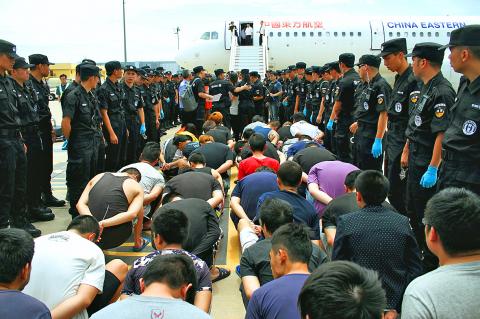Beijing yesterday rejected Taiwan’s protest over Cambodia handing over Taiwanese fraud suspects to Chinese authorities, saying for the first time that the cross-strait communications mechanism “has been suspended” since the new government took office in Taipei last month.
China’s Taiwan Affairs Office spokesperson An Fengshan (安峰山) made the remark while answering reporters’ questions about Taipei’s protest over Cambodia’s decision to accept Beijing’s demand and send Taiwanese telecommunications fraud suspects to China for prosecution.
The mechanism for contact and communication between China and Taiwan “has been suspended” since May 20, as Taipei has not recognized the so-called “1992 consensus,” which he said is the foundation for cross-strait relations that embodies the “one China” principle.

Photo: AFP/STR
Beijing has repeatedly said that the new government of President Tsai Ing-wen (蔡英文) must accept the “1992 consensus” for what it called the warm bilateral ties over the past eight years to continue.
The “1992 consensus” refers to a tacit understanding reached during cross-strait talks in 1992 that both Taiwan and China acknowledge that there is “one China,” with each side having its own interpretation of what that means. In 2006, former Mainland Affairs Council chairman Su Chi (蘇起) admitted he made up the term in 2000, before the Chinese Nationalist Party (KMT) handed power to the Democratic Progressive Party.
Efforts to fight telecom fraud and to protect the rights of victims have won the support of people in both China and Taiwan, An said.
He said that there were 25 Taiwanese in the group of 39 suspects sent to China on Friday, although earlier reports indicated that the group sent to Wenzhou in Zhejiang Province included 18 Taiwanese.
An’s comments came after the Mainland Affairs Council issued a statement on Friday voicing regret and protesting China’s failure to respect the appeal by Taiwan that no more Taiwanese suspects should be sent to China until the two sides can work out a set of principles on how to handle such issues.
Taipei has come under domestic pressure and has tried to prevent Taiwanese arrested overseas from being deported to China, although that pressure has eased after revelations that tens of thousands of Taiwanese, many of whom operate abroad to avoid detection, might be engaging in fraud targeting not only Chinese, but Taiwanese as well.
Dozens of Taiwanese fraud suspects were extradited from Kenya to China through Malaysia earlier this year, triggering an angry response.
As of press time last night, no response was available from the Mainland Affairs Council on An’s remarks.

A Ministry of Foreign Affairs official yesterday said that a delegation that visited China for an APEC meeting did not receive any kind of treatment that downgraded Taiwan’s sovereignty. Department of International Organizations Director-General Jonathan Sun (孫儉元) said that he and a group of ministry officials visited Shenzhen, China, to attend the APEC Informal Senior Officials’ Meeting last month. The trip went “smoothly and safely” for all Taiwanese delegates, as the Chinese side arranged the trip in accordance with long-standing practices, Sun said at the ministry’s weekly briefing. The Taiwanese group did not encounter any political suppression, he said. Sun made the remarks when

The Taiwanese passport ranked 33rd in a global listing of passports by convenience this month, rising three places from last month’s ranking, but matching its position in January last year. The Henley Passport Index, an international ranking of passports by the number of designations its holder can travel to without a visa, showed that the Taiwan passport enables holders to travel to 139 countries and territories without a visa. Singapore’s passport was ranked the most powerful with visa-free access to 192 destinations out of 227, according to the index published on Tuesday by UK-based migration investment consultancy firm Henley and Partners. Japan’s and

BROAD AGREEMENT: The two are nearing a trade deal to reduce Taiwan’s tariff to 15% and a commitment for TSMC to build five more fabs, a ‘New York Times’ report said Taiwan and the US have reached a broad consensus on a trade deal, the Executive Yuan’s Office of Trade Negotiations said yesterday, after a report said that Washington is set to reduce Taiwan’s tariff rate to 15 percent. The New York Times on Monday reported that the two nations are nearing a trade deal to reduce Taiwan’s tariff rate to 15 percent and commit Taiwan Semiconductor Manufacturing Co (TSMC, 台積電) to building at least five more facilities in the US. “The agreement, which has been under negotiation for months, is being legally scrubbed and could be announced this month,” the paper said,

NATIONAL SECURITY THREAT: An official said that Guan Guan’s comments had gone beyond the threshold of free speech, as she advocated for the destruction of the ROC China-born media influencer Guan Guan’s (關關) residency permit has been revoked for repeatedly posting pro-China content that threatens national security, the National Immigration Agency said yesterday. Guan Guan has said many controversial things in her videos posted to Douyin (抖音), including “the red flag will soon be painted all over Taiwan” and “Taiwan is an inseparable part of China,” while expressing hope for expedited “reunification.” The agency received multiple reports alleging that Guan Guan had advocated for armed reunification last year. After investigating, the agency last month issued a notice requiring her to appear and account for her actions. Guan Guan appeared as required,